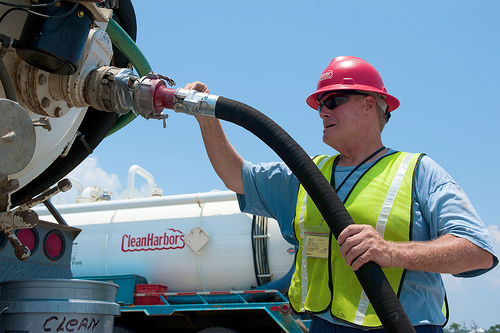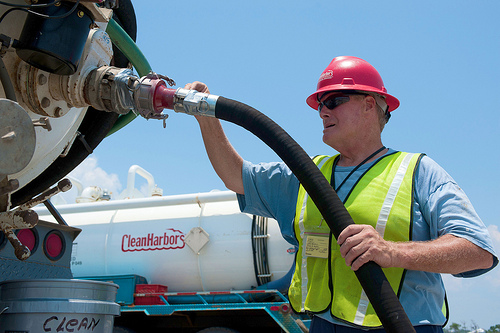 Skimmed oil from the Gulf is pumped into recovery trucks.Photo: BP AmericaCross-posted from the Center for American Progress. This post was coauthored by Valeri Vasquez, special assistant for energy policy at the Center for American Progress.
Skimmed oil from the Gulf is pumped into recovery trucks.Photo: BP AmericaCross-posted from the Center for American Progress. This post was coauthored by Valeri Vasquez, special assistant for energy policy at the Center for American Progress.
The numbers don’t lie. Tax loopholes allow Big Oil companies to ratchet up their annual earnings at the expense of American taxpayers. Well-placed campaign contributions to their congressional allies preserve these undeserved handouts.
Americans eager to reduce the mammoth federal debt that threatens our economy’s long-term prosperity overwhelmingly support ridding the tax code of these unnecessary subsidies. As Seth Hanlon, director of fiscal reform, and Michael Ettlinger, vice president for economic policy at the Center for American Progress, explain [PDF], tax breaks for oil companies and other superfluous “spending in the tax expenditure budget is fertile ground for deficit reduction.” But on May 5, Republicans unanimously voted down a Democratic attempt to put forward legislation that would end subsidies to oil companies. Seven Democrats also opposed the measure.
So here is a by-the-numbers examination of what Big Oil is costing us, plus a few examples of where the billions of dollars salvaged from their balance sheets might be better spent.
The cost of Big Oil’s loopholes:
- $4 billion: Cost of Big Oil tax breaks in 2011.
- $2 billion: Cost of Big Oil tax breaks which would be eliminated by the Close Big Oil Tax Loopholes Act (S. 940).
- $77 billion: Cost of Big Oil tax breaks from 2011 to 2021.
Big Oil profits pile up:
- $902 billion: Total profits for the five biggest oil companies in the United States, 2001-2010 (in 2011 dollars).
- $32 billion: Total Big Oil earnings, first quarter of 2011. Exxon Mobil alone accounted for $10.7 billion of that figure.
- 38 percent: Big Oil’s first-quarter-2011 profit increase over the first quarter of 2010.
- 28 percent: Increase in gasoline prices compared to 2010.
- 53 percent: Portion of their profits that both Exxon Mobil and ConocoPhillips spent repurchasing stock to drive up their companies’ share values in the first quarter of 2011.
- $8 billion: The amount of first-quarter profits the big five companies spent on stock buybacks.
Low effective tax rates for Exxon Mobil:
- 17.6 percent: Average effective federal corporate tax rate paid by Exxon Mobil, 2008-2010.
- 20.4 percent [PDF]: Average American individual federal effective tax rate in 2007 (the last year of available data).
Oil campaign cash and votes to close loopholes:
- $273,500: Big Oil campaign contributions to Republican senators and representatives in the first quarter of 2011.
- $7,000: Big Oil campaign contributions to Democratic senators and representatives in the first quarter of 2011.
- Two: House Republicans who voted to cut tax loopholes for Big Oil during debate on the “Restarting American Offshore Leasing Now Act,” H.R. 1230.
- 147: House Democrats who voted to cut tax loopholes for Big Oil during debate on H.R. 1230.
- Zero: House Democrats who voted for $30 billion in Medicare cuts in the FY 2012 budget resolution that was passed by the House on April 15.
- Four: Republicans who voted against $30 billion in Medicare cuts in the FY 2012 budget.
- 44: Senators who voted to close Big Oil tax loopholes and use savings to offset health-care costs.
Public supports ending tax breaks:
- 66 percent: The proportion of Americans who say gas prices are taking a toll on their personal finances, according to a recent CNN poll.
- 74 percent: The proportion of Americans who favor “eliminating tax credits for the oil and gas industry,” according to a NBC News/Wall Street Journal survey.
- 2-to-1: The margin by which “Republican voters support ending subsidies” for oil companies.
What oil tax dollars could buy:
- $21 billion reduction in the federal budget deficit by enactment of the Close Big Oil Tax Loopholes Act, which would close tax loopholes for the big five oil companies over the next 10 years.
- $30 billion for Medicare if tax loopholes were eliminated for all Big Oil companies. This would offset the Medicare cuts in the fiscal year 2012 budget resolution that was passed by the House on April 15.
- $1 billion could pay the salaries of 18,000 high school teachers earning an average of $55,000 per year.
- $1 billion could pay for 251,000 Pell Grants to aspiring college students. These grants are essential to help these scholars pay for tuition, and averaged $3,984 apiece in 2011.
Senate Democratic leaders are determined to stem these unnecessary subsidies flowing to the five biggest oil companies — BP, Chevron, ConocoPhillips, Exxon Mobil, and Royal Dutch Shell. The Senate is expected to vote next week on the Close Big Oil Tax Loopholes Act, introduced by Sens. Robert Menendez (D-N.J.), Sherrod Brown (D-Ohio), Claire McCaskill (D-Mo.), and 24 other senators. It would close $2 billion worth of tax loopholes for these five companies. Senate Majority Leader Harry Reid (D-Nev.) and Finance chair Max Baucus (D-Mont.) also support cutting off the corporate welfare given to these oil companies.
On May 12, the CEOs of the big five oil companies will testify about these tax loopholes before the Senate Finance Committee. Hopefully they will explain how they can justify spending billions of dollars on these tax loopholes when other priorities face severe cuts.



